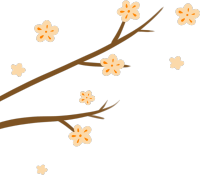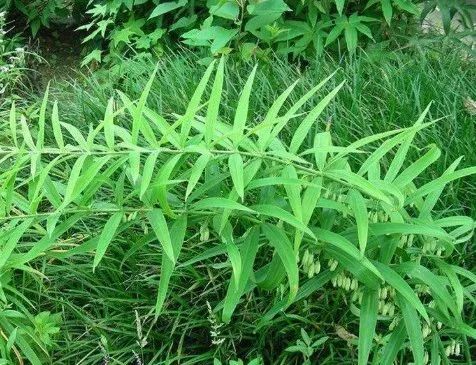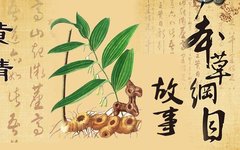 Mei Quanxi Column
Mei Quanxi Column
Compendium of Materia Medica
Volume Twelve: The Legend of Huang Jing

XU Xuan’s “Records of the Divine” states: A maid from a wealthy family in Linchuan escaped into the deep mountains. After a long time, she found wild grass with lovely branches and leaves, took the roots to eat, and was never hungry for a long time. One night, while resting under a big tree, she heard movement in the grass and thought it was a tiger, so she climbed the tree to avoid it. When dawn came, she found herself floating down as if she were a bird. Years later, a family member saw her while gathering firewood and tried to catch her but failed. They set a net at the cliff, but she jumped to the mountain top. Some said this maid had a celestial bone, but it was just the spirit herb she consumed. They placed wine and food along her path, and she came, ate, and could not leave. Captured, she explained that the grass she ate was Huang Jing.
1. The Story of Huang Jing
In the “Compendium of Materia Medica”, Li Shizhen introduces a story: A maid from a wealthy family in Linchuan, unable to endure her master’s abuse, escaped into the deep mountains. Hungry and tired, she sat by a mountain stream for a long time. She discovered a wild grass with tender green leaves, washed it in water, and ate it all. Finding it delicious, she continued to eat this grass to satisfy her hunger. Over time, she felt her body becoming lighter and stronger.
Every night she rested under a big tree, and one night, she suddenly heard a wild animal moving in the grass. Thinking it was a tiger, she was frightened and tried to climb the tree. Without realizing it, she found herself resting on the treetop. When dawn came, she thought about climbing down, but suddenly her body floated down. Thus, wherever she thought to go, her body floated there freely, like a bird flying from one mountain top to another. Years later, a servant from the wealthy family went into the mountains to gather firewood and discovered her. He reported back to the master, who immediately sent people to capture her, but they could not. One day, they found her under a cliff and set a net to trap her from three sides. She leaped and soared to the cliff top. The master was even more frightened and determined to capture her. He thought, “Does this maid have a celestial bone?” Later, he suspected she might have eaten some spirit herb, so he prepared delicious food and placed it on her usual path to lure her. The maid, smelling the food, indeed came and ate it all. After several days, she could no longer fly as lightly as before and was captured. Upon questioning, she explained everything and pointed out the wild grass she ate, which was Huang Jing.
This story is quite miraculous, although it exaggerates the effects of Huang Jing—”Long-term consumption makes one light and prolongs life without hunger.” However, Huang Jing is indeed a tonic herb, as long-term clinical practice has verified.
2. The Name of Huang Jing
Huang Jing (Rhizoma Polygonati) belongs to the lily family and can be classified into different types based on its origin: Yunnan Huang Jing, Huang Jing, or Multi-flower Huang Jing. Based on its shape, it is commonly referred to as “Large Huang Jing,” “Chicken Head Huang Jing,” or “Ginger-shaped Huang Jing.” Li Shizhen in the “Compendium of Materia Medica” states: “Huang Jing is a vital medicinal herb for consumption, thus listed first in the vegetable section of the ‘Bielu.’ Immortals consider it akin to Ganoderma, as it derives its essence from the earth, hence named Huang Jing.”
3. Pharmacological Effects
Huang Jing is sweet in taste, neutral in nature, and non-toxic. It has the effects of tonifying Qi and nourishing Yin, strengthening the spleen, moistening the lungs, and benefiting the kidneys. It is commonly used for spleen and stomach Qi deficiency, fatigue, insufficient stomach Yin, dry mouth, reduced appetite, lung deficiency with dry cough, cough with blood, insufficient essence and blood, weak lower back and knees, premature graying of hair, and internal heat with thirst. Modern pharmacological studies show that Huang Jing has antibacterial, antiviral, antioxidant, anti-fatigue, anti-aging, and blood pressure and blood sugar-lowering effects.
In clinical practice, for treating lung dryness due to Yin deficiency and dry cough without phlegm, it is often used with Sha Shen (Adenophorae Radix), Mai Dong (Ophiopogonis Radix), Zhi Mu (Anemarrhenae Rhizoma), and Bei Mu (Fritillariae Bulbus); for treating tuberculosis with cough and blood, it can be used with Bai Ji (Bletillae Rhizoma), Bai Bu (Stemonae Radix), Huang Qin (Scutellariae Radix), and Dan Shen (Salviae Miltiorrhizae Radix); for treating spleen Qi deficiency with poor appetite and fatigue, it is often combined with Bai Zhu (Atractylodis Macrocephalae Rhizoma), Fu Ling (Poria), Gan Cao (Glycyrrhizae Radix), and Chen Pi (Citri Reticulatae Pericarpium); if stomach Yin is injured, with a red tongue and dry mouth, it is often paired with Dang Gui (Angelica Sinensis) and Shu Di (Rehmanniae Radix); for treating thirst (diabetes), it is commonly combined with Huang Qi (Astragali Radix), Shan Yao (Dioscoreae Rhizoma), Sheng Di (Rehmanniae Radix), and Xuan Shen (Scrophulariae Radix) to tonify Qi and nourish Yin.
4. Folk Remedies
Many folk prescriptions and effective formulas for Huang Jing are widely circulated and have shown clinical efficacy.
1. Huang Jing and Goji Berry Pills
For nourishing the kidneys and tonifying Yin—grind equal parts of Huang Jing and Goji berries into a fine powder, mix, and press into cakes, dry, and grind again into powder, then mix with honey to form pills the size of a wutong seed. Take five pills with warm water on an empty stomach. For treating spleen and stomach weakness and fatigue, use 30 grams each of Huang Jing and Huai Shan Yao (Chinese Yam), steamed with chicken for consumption.
2. For treating post-tuberculosis weakness
Use 15-30 grams of Huang Jing stewed with pork for consumption.
3. For treating children’s lower limb weakness
Use 30 grams of Huang Jing and 30 grams of winter honey, stewed with boiling water for consumption.
4. For treating eye diseases with liver-nourishing and vision-improving powder
Use 500 grams of turnip seeds (washed), 100 grams of Huang Jing, steam both ingredients nine times with water, dry, crush into powder, and sift through a fine sieve. Take 6-7 grams each morning and evening.

Hand-drawn illustration of Huang Jing
Plant illustration




Warm Reminder
It should be noted that Huang Jing can easily assist dampness, so those with spleen deficiency and excess dampness, or those with cough and phlegm should avoid it.
We welcome everyone to leave comments below, sharing insights gained from reading the stories of Chinese herbs.
References: “Chinese Herbal Market and Information”, 1994, (2): 30

